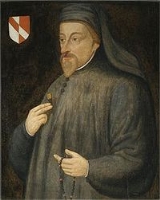
, is widely considered the greatest English poet
of the Middle Ages
and was the first poet to have been buried in Poet's Corner of Westminster Abbey
. While he achieved fame during his lifetime as an author
, philosopher, alchemist
and astronomer
, composing a scientific treatise on the astrolabe for his ten year-old son Lewis, Chaucer also maintained an active career in the civil service as a bureaucrat
, courtier
and diplomat
.
The lyf so short, the craft so longe to lerne.Th’ assay so hard, so sharp the conquerynge,The dredful joye, alwey that slit so yerne;Al this mene I be love.![]()
For out of olde feldes, as men seith,Cometh al this new corn fro yeer to yere;And out of olde bokes, in good feith,Cometh al this newe science that men lere.![]()
Soun is noght but air ybroken,And every speche that is spoken,Loud or privee, foul or fair,In his substaunce is but air;For as flaumbe is but lighted smoke,Right so soun is air ybroke.![]()
For I am shave as neigh as any frere.But yit I praye unto youre curteisye:Beeth hevy again, or elles moot I die.![]()
Ye knowe eek, that in forme of speche is chaungeWithinne a thousand yeer, and wordes thoThat hadden prys, now wonder nyce and straungeUs thinketh hem; and yet they spake hem so,And spedde as wel in love as men now do;Eek for to winne love in sondry ages,In sondry londes, sondry ben usages.![]()
For which he wex a litel red for shame,Whan he the peple upon him herde cryen,That to beholde it was a noble game,How sobreliche he caste doun his yen.Criseyda gan al his chere aspyen,And let so softe it in her herte sinkeThat to herself she seyde, “Who yaf me drinke?”![]()
Or as an ook comth of a litel spir,So thorugh this lettre, which that she hym sente,Encressen gan desir, of which he brente.![]()
It is nought good a slepyng hound to wake.![]()
For of fortunes sharp adversiteeThe worst kynde of infortune is this,A man to han ben in prosperitee,And it remembren, whan it passed is.![]()
Oon ere it herde, at tothir out it wente.![]()

